许国璋英语第一册第十三课课文、对话、练习、答案
- 格式:docx
- 大小:40.45 KB
- 文档页数:8
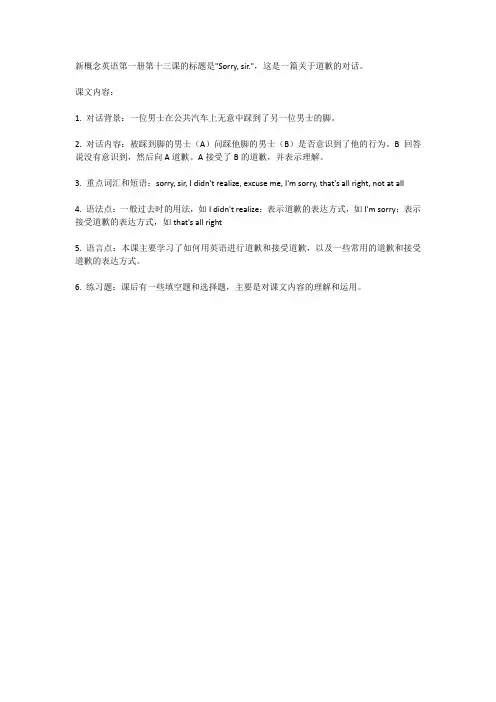
新概念英语第一册第十三课的标题是"Sorry, sir.",这是一篇关于道歉的对话。
课文内容:
1. 对话背景:一位男士在公共汽车上无意中踩到了另一位男士的脚。
2. 对话内容:被踩到脚的男士(A)问踩他脚的男士(B)是否意识到了他的行为。
B回答说没有意识到,然后向A道歉。
A接受了B的道歉,并表示理解。
3. 重点词汇和短语:sorry, sir, I didn't realize, excuse me, I'm sorry, that's all right, not at all
4. 语法点:一般过去时的用法,如I didn't realize;表示道歉的表达方式,如I'm sorry;表示接受道歉的表达方式,如that's all right
5. 语言点:本课主要学习了如何用英语进行道歉和接受道歉,以及一些常用的道歉和接受道歉的表达方式。
6. 练习题:课后有一些填空题和选择题,主要是对课文内容的理解和运用。
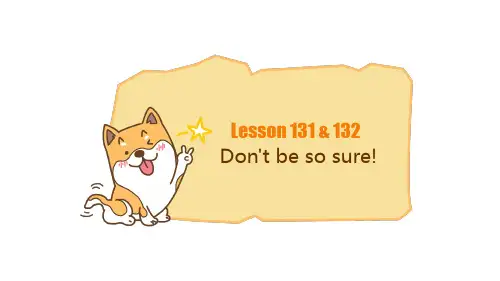
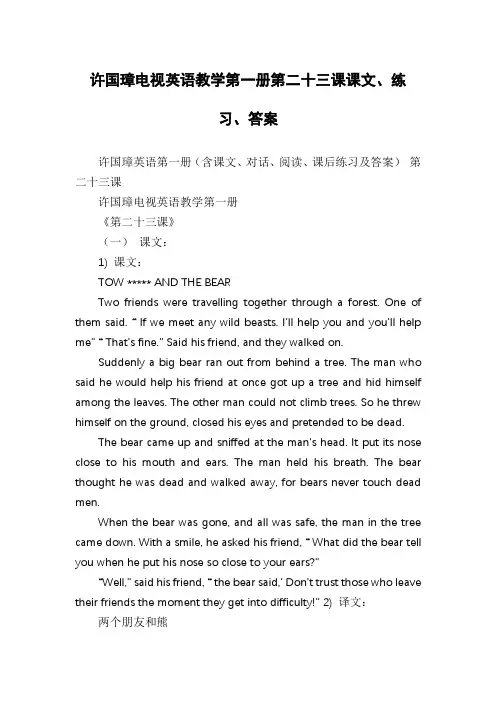
许国璋电视英语教学第一册第二十三课课文、练习、答案许国璋英语第一册(含课文、对话、阅读、课后练习及答案)第二十三课许国璋电视英语教学第一册《第二十三课》(一)课文:1) 课文:TOW ***** AND THE BEARTwo friends were travelling together through a forest. One of them said. “ If we meet any wild beasts. I’ll help you and you’ll help me” “ That’s fine.” Said his friend, and they walked on.Suddenly a big bear ran out from behind a tree. The man who said he would help his friend at once got up a tree and hid himself among the leaves. The other man could not climb trees. So he threw himself on the ground, closed his eyes and pretended to be dead.The bear came up and sniffed at the man’s head. It put its nose close to his mouth and ears. The man held his breath. The bear thought he was dead and walked away, for bears never touch dead men.When the bear was gone, and all was safe, the man in the tree came down. With a smile, he asked his friend, “ What did the bear tell you when he put his nose so close to your ears?”“Well,” said his friend, “ the bear said,’ Don’t trust those who leave their friends the moment they get into difficulty!” 2) 译文:两个朋友和熊两个朋友在一道旅行,穿过一座森林。
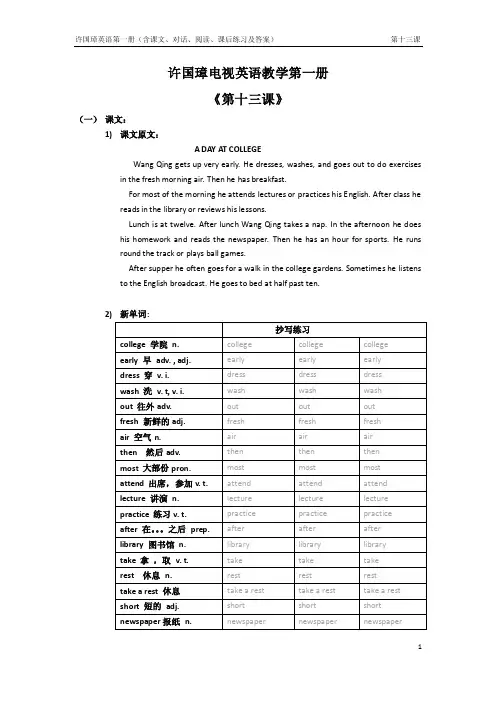
许国璋电视英语教学第一册《第十三课》(一)课文:1)课文原文:A DAY AT COLLEGEWang Qing gets up very early. He dresses, washes, and goes out to do exercises in the fresh morning air. Then he has breakfast.For most of the morning he attends lectures or practices his English. After class hereads in the library or reviews his lessons.Lunch is at twelve. After lunch Wang Qing takes a nap. In the afternoon he doeshis homework and reads the newspaper. Then he has an hour for sports. He runsround the track or plays ball games.After supper he often goes for a walk in the college gardens. Sometimes he listensto the English broadcast. He goes to bed at half past ten.2)新单词:3)课文译文:校园一日王清起得很早。
他穿好衣、洗完脸,就走到室外,在清爽的晨风中做早操,然后去吃早饭。
上午的大部分时间他听课或者练习英语,课后他到图书馆看书,或者复习功课。
12点吃午饭,饭后王清休息一会儿。
下午他做作业、看报纸,随后有一小时的体育活动时间,他或者沿跑道跑跑步或者打打球。
晚饭后他常常去学校花园里散步,有时还收听英语广播。
晚上他预习功课,10点半睡觉。
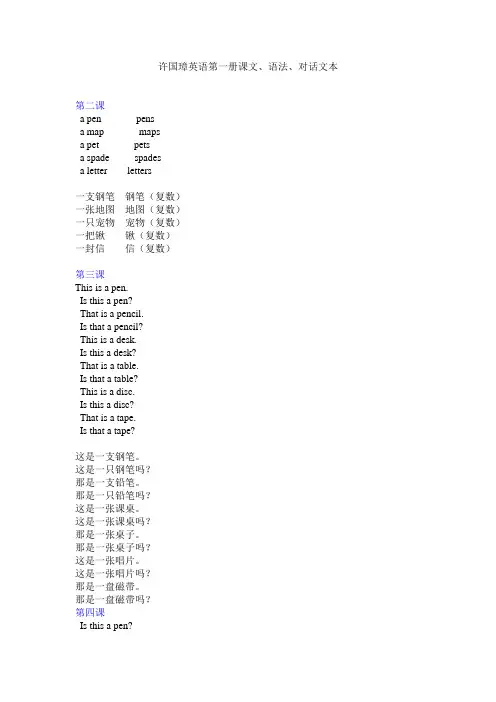
许国璋英语第一册课文、语法、对话文本第二课a pen pensa map mapsa pet petsa spade spadesa letter letters一支钢笔钢笔(复数)一张地图地图(复数)一只宠物宠物(复数)一把锹锹(复数)一封信信(复数)第三课This is a pen.Is this a pen?That is a pencil.Is that a pencil?This is a desk.Is this a desk?That is a table.Is that a table?This is a disc.Is this a disc?That is a tape.Is that a tape?这是一支钢笔。
这是一只钢笔吗?那是一支铅笔。
那是一只铅笔吗?这是一张课桌。
这是一张课桌吗?那是一张桌子。
那是一张桌子吗?这是一张唱片。
这是一张唱片吗?那是一盘磁带。
那是一盘磁带吗?第四课Is this a pen?It is a green pen.It that a pencil? Yes, it is.It is a red pencil.Is this a desk?No, it isn't.It is a table.Is that a pick?No, it isn't.It is a spade.These are desks.Are these tables? No, they aren't.They are desks. Those are knives.Are those pencils? No, they aren't.They are knives.这是一支钢笔吗?是的。
这是一支绿色的钢笔。
那是一支铅笔吗?是的。
那是一支红色的铅笔。
这是一张课桌吗?不,不是。
它是一张桌子。
那是一把镐吗?不,不是。
它是一把锹。
这些是课桌。
这些是桌子吗?不,不是。
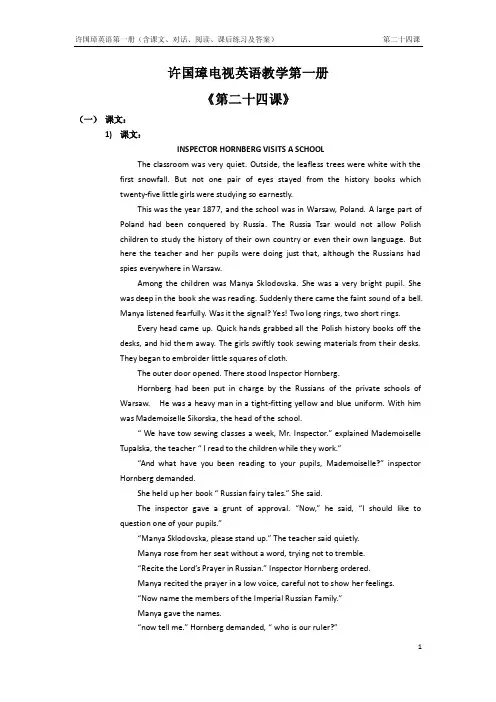
许国璋电视英语教学第一册《第二十四课》(一)课文:1)课文:INSPECTOR HORNBERG VISITS A SCHOOLThe classroom was very quiet. Outside, the leafless trees were white with the first snowfall. But not one pair of eyes stayed from the history books whichtwenty-five little girls were studying so earnestly.This was the year 1877, and the school was in Warsaw, Poland. A large part of Poland had been conquered by Russia. The Russia Tsar would not allow Polishchildren to study the history of their own country or even their own language. Buthere the teacher and her pupils were doing just that, although the Russians hadspies everywhere in Warsaw.Among the children was Manya Sklodovska. She was a very bright pupil. She was deep in the book she was reading. Suddenly there came the faint sound of a bell.Manya listened fearfully. Was it the signal? Yes! Two long rings, two short rings.Every head came up. Quick hands grabbed all the Polish history books off the desks, and hid them away. The girls swiftly took sewing materials from their desks.They began to embroider little squares of cloth.The outer door opened. There stood Inspector Hornberg.Hornberg had been put in charge by the Russians of the private schools of Warsaw. He was a heavy man in a tight-fitting yellow and blue uniform. With himwas Mademoiselle Sikorska, the head of the school.“ We have tow sewing classes a week, Mr. Inspector.” explained Mademoiselle Tupalska, the teacher “ I read to the children while they work.”“And what have you been reading to your pupils, Mademoiselle?”inspector Hornberg demanded.She held up her book “ Russian fairy tales.” She said.The inspector gave a grunt of approval. “Now,”he said, “I should like to question one of your pupils.”“Manya Sklodovska, please stand up.” The teacher said quietly.Manya rose from her seat without a word, trying not to tremble.“Recite the Lord’s Prayer in Russian.” Inspector Hornberg ordered.Manya recited the prayer in a low voice, careful not to show her feelings.“Now name the members of the Imperial Russian Family.”Manya gave the names.“now tell me.” Hornberg demanded, “ who is our ruler?”Manya’s face went pale. She opened her mouth, but the words would not come.“So, my little Polish patriot, you do not wish to tell me who rules over us.” the Russian inspector said. “answer me!”“His Majesty AlexanderⅡ, Tsar of All the Russia,” she said. But her voice was trembling.“That’s more like it,”Hornberg rose from his chair. “Now Mademoiselle Sikorska, I wish to visit one of the other classes.”“Certainly, Mr. Inspector, “ Mademoiselle Sikorska answered.When the door had closed upon them, the schoolgirls began to stir. Without a word, the teacher put her arms around Manya and kissed her. Manya was in tears.2)译文:霍恩伯格督学查看学校教室里鸦雀无声。
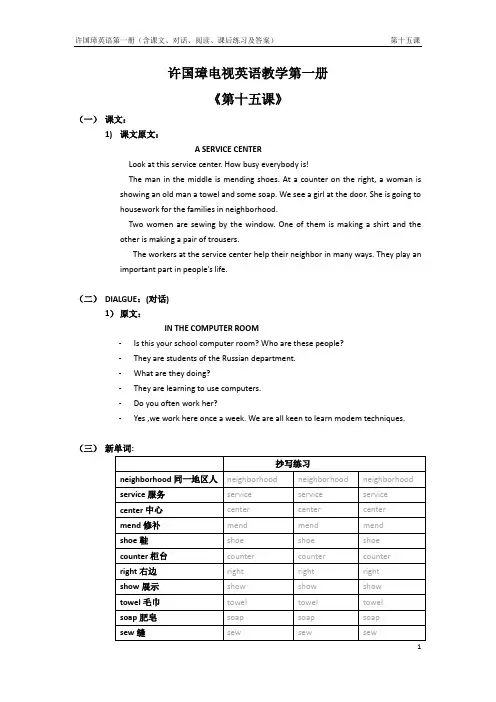
许国璋电视英语教学第一册《第十五课》(一)课文:1)课文原文:A SERVICE CENTERLook at this service center. How busy everybody is!The man in the middle is mending shoes. At a counter on the right, a woman isshowing an old man a towel and some soap. We see a girl at the door. She is going tohousework for the families in neighborhood.Two women are sewing by the window. One of them is making a shirt and theother is making a pair of trousers.The workers at the service center help their neighbor in many ways. They play an important part in people’s life.(二)DIALGUE:(对话)1)原文:IN THE COMPUTER ROOM-Is this your school computer room? Who are these people?-They are students of the Russian department.-What are they doing?-They are learning to use computers.-Do you often work her?-Yes ,we work here once a week. We are all keen to learn modem techniques.(三)新单词:(四)译文:1)课文译文:服务中心瞧这家服务中心,大伙儿多忙呀!中间这位男子正在修鞋,靠右边的柜台里,女售货员拿出毛巾和肥皂给一位老人看。
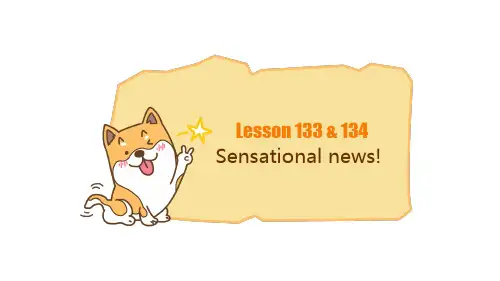

高级英语第一册13课13.Britannia Rues the Waves1. grab the headlines2.Yet shipping is the essential lifeline for the nation?s economy.3.It earn £1000 million a year in foreign exchange earnings: without our merchant fleet, the balance of payments would be permanently in deficit, despite North Sea oil.4. But now this vital British industry is more in peril than ever before.5.On almost all the major sea routes of the world, the British fleet risks being elbowed out by stiff foreign competition.6.The Russians and the Eastern bloc countries who are now in the middle of a massive expansion of their merchant navies, and carving their way into the international shipping trade by severely undercutting the Western shipping companies.通过大幅度削价与西方船运公司竞争已跻身国际船运界7.The merchant fleets of the developing nations, who are bent on taking over the lion?s share of the trade between Europe and America, Asia and the Far East—routes in which Britain has a big stake.大部分份额/ 利益攸关8.The Britain fleet no long dominates the high sea.公海, 外海9. In the early 1960s, the shipping companies cashed in on government grants and tax concessions.政府资助和减税优惠Let's cash in on the fine weather and go10.In the19th century, competition between sailing-ships and steam-ships became cut-throat, and price-cutting ruined many long-established companies. 老牌公司11.It was in fact a cartel, though the British ship-owners gave it the more dignified name of a “conference”. Stand the test of time.12.take some of the risk out of the dodgy business of moving goods by sea.13. They make it harder, perhaps, to make a good killing 大发横财/大赚一把in good times, because you have to share the trade with other conference members. But they make it easier to weather the bad times, because there is no mad, competitive scramble for the available trade.14. the quadrupling oil price15. By 1974, the industrialized world had begun its slide into the worst depression since the 1930s.16. As oil demand cut back, charter rates plummeted, and the estuaries of t he world became jammed with the steadily increasing numbers of moth-ball tankers.17. By 1976, the slump had begun to bite into the bulk carrier trade. Bulk carriers are ships that carry dry cargo of one particular kind, such as sugar, coal or wheat, with iron core being by far the most important. 驳船生意18.With the world steel industry deep in the doldrums, who need iron ore carriers?19. With its big bulk carrier fleet , the British shipping industry now began to feel the pinch.20. Bankruptcy / weather the economic storm /the scheduled freight-liner services—and that is where Britain?s fleet strongly entrenched. / liner-freight vessels follow agreed routes, or lines, and call at ports on agreed dates,沿着预先制定的路线,定期抵达各港口21. a shipment of tractor parts / the going freight rate22.It is an ideal “parcel” service for people with cargoes that are not big enough to make it worth chartering a whole ship. “零担运输”业务23.Plus 有利条件,优势It is also a plus for the ship-owners not to be dependent on only one customer. Liner ships carry all sorts of different cargoes—mainly finished manufactured goods—so, if there is a slump in one particular industry, provided there is still buoyancy in other industries, the line fleets can still survive (iv)them a distinct advantage over…工业制成品24.Much of Britain …s liner fleet rarely sees a British port. Our ships are extensive cross-trader.远洋国际商船25.Until recently, those routes were highly profitable for the Britishcompanies, and a major source of foreign currency for Britain. They are also the routes on which the Third World and the Russians are out to make the biggest inroads.26. Most emerging countries in the Third World are out to carry a bigger share of their trade in their own ships. Developing countries regard a merchant navy as something of a status symbol—the next thing to go for after a national airline.27.But P&O has no intention of throwing in the towel. The key tactic behind its strategy of holding on to the richest slice of the trade has been to move up-market—to go where the Third World cannot follow: into high-technology investment.丰厚的利润/ 高端市场28.Put up the money to pioneer the international deep-sea container service. / warehouse /dockside…and they are very secure against theft; except for a code number on the outside, there is no indication of what is inside the box.29…. Is far from being the whole answer to the Third Worldthreat. The developing countries are not out to compete with Western fleets by commercial means; they want to impose a set of rules which will guarantee them a major slice of the shipping trades.30.This demand has found official expression in the United Nations Conference on Trade and Development, UNCTAD. The UNCTAD liner code lays down that…正式提出/ 海运法规31.Revenue / Not enough countries have ratified the UNCTAD code yet to bring it into force. But if it does become universal, it could strike a severe blow to Britain?s liner trade.32.The Iron curtain countries represent an even greater and more organized threat to the future of Britian?s liner ships, and it is a threat that is much more difficult to counter/respond to.33…the growth in either its own trade or world trade would justify. Come into service/ And with its policy of excessively low freight rates, the Russian merchant navy has already made major inroads into Western trade. 超低运费策略34.Its seaborne trade with EEC/ It is biting deeply into the major cross-trading routes of the world. 他已经侵入到世界各大跨国贸易航线have already captured 20% of the cargo traffic on the busy sea- lanes of the North Atlantic.35. make a profit / hard currency 硬通货It doesn?t matter very much if they are operating at a loss; that can be made up by the Soviet government in roubles.36.But there is more to it than that for the Russians.还有别的目的,意义远非如此37.‘Mer cantile marine / merchant fleet商船队38.expand the Soviet reach well beyond its perimeters.39. So this mercantile marine capability is certainly a great advancein the Soviet ability to project their power at some distance from their own frontiers.40. And this is also part of a general Soviet hydrographic policy to map the oceans of the world, to get to know its ports and, above all, to deepen contacts with the states with whom the Russians are developing close trading ties.海洋勘测总规划41.Counter sth. at an international level42. Concerted action on that issue / coordinated response43. Trade department looks after shipping / Industry department oversees shipbuilding44. Ship-owners fear that saving jobs in Britain?s ailing shipyards comes well before saving its merchant fleet.病入膏肓的造船业45.British shipyards are currently churning out 24 vessels for Poland. The Poles were lured to Britain by the gift of a £28 million sunsidy and the promise that British shipbuilders would raise all the credit, so while our shipping fleet is under attack from communist ships, our government is using British taxpayers? money to cut their shipbuilding costs. 英国的造船厂最近正在为波兰赶制24艘船只。
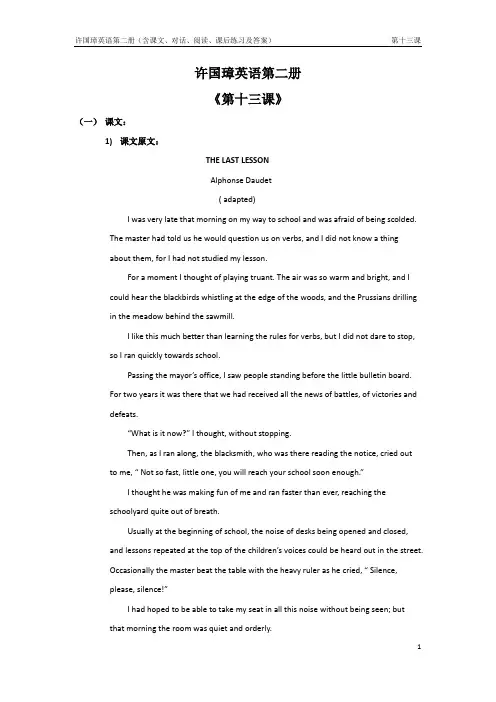
许国璋英语第二册《第十三课》(一)课文:1)课文原文:THE LAST LESSONAlphonse Daudet( adapted)I was very late that morning on my way to school and was afraid of being scolded.The master had told us he would question us on verbs, and I did not know a thingabout them, for I had not studied my lesson.For a moment I thought of playing truant. The air was so warm and bright, and I could hear the blackbirds whistling at the edge of the woods, and the Prussians drillingin the meadow behind the sawmill.I like this much better than learning the rules for verbs, but I did not dare to stop,so I ran quickly towards school.Passing the mayor’s office, I saw people standing before the little bulletin board.For two years it was there that we had received all the news of battles, of victories anddefeats.“What is it now?” I thought, without stopping.Then, as I ran along, the blacksmith, who was there reading the notice, cried out to me, “ Not so fast, little one, you will reach your school soon enough.”I thought he was making fun of me and ran faster than ever, reaching theschoolyard quite out of breath.Usually at the beginning of school, the noise of desks being opened and closed, and lessons repeated at the top of the children’s voices could be heard out in the street.Occasionally the master beat the table with the heavy ruler as he cried, “ Silence,please, silence!”I had hoped to be able to take my seat in all this noise without being seen; butthat morning the room was quiet and orderly.Through the open window I saw my schoolmates already in their places. The master was walking up and down the room with the iron ruler under his arm and a book in his hand.As I entered he looked at me kindly, and said, without scolding,” Go quickly to your place, little Franz; we were going to begin without you. You should have been here five minutes ago.”I climbed over my bench and sat down at once at my desk. Just then I noticed, for the first time, that our master wore his fine green coat and his black silk embroidered cap.But what surprised me most was to see some of the village people seated on the benches at the end of the room. One of them was holding an old spelling book on his knee; and they all looked sadly at the master.While I was wondering at this, our schoolmaster took his place. “ Children,” he said, “ this is the last time that I shall give you a lesson. An order has come from Berlin that no language but German may be taught in the schools of Alsace and Lorraine. A new master will come tomorrow who will teach you German. Today is your last lesson in French. I beg you to pay attention.”These words frightened me. This was what they had posted on the bulletin board then! This was what the blacksmith was reading!(to be continued)2)全文译文:最后一课阿方斯·都德(改写)那天早上我很晚才去上学,心中害怕要挨训斥。
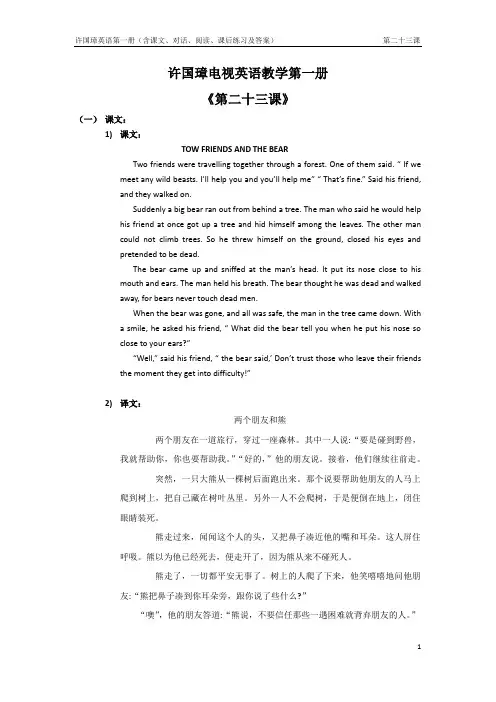
许国璋电视英语教学第一册《第二十三课》(一)课文:1)课文:TOW FRIENDS AND THE BEARTwo friends were travelling together through a forest. One of them said. “ If we meet any wild beasts. I’ll help you and you’ll help me”“ That’s fine.” Said his friend,and they walked on.Suddenly a big bear ran out from behind a tree. The man who said he would help his friend at once got up a tree and hid himself among the leaves. The other mancould not climb trees. So he threw himself on the ground, closed his eyes andpretended to be dead.The bear came up and sniffed at the man’s head. It put its nose close to his mouth and ears. The man held his breath. The bear thought he was dead and walkedaway, for bears never touch dead men.When the bear was gone, and all was safe, the man in the tree came down. Witha smile, he asked his friend, “ What did the bear tell you when he put his nose soclose to your ears?”“Well,” said his friend, “ the bear said,’Don’t trust those who leave their friends the moment they get into difficulty!”2)译文:两个朋友和熊两个朋友在一道旅行,穿过一座森林。
许国璋电视英语教学第一册《第十六课》(一)课文:1)课文原文:SUNDAY IN THE PARKIt is Sunday. There are hundreds and hundreds of people in the park. Some are walking by the lake. Others are sitting on the benches and chatting. Over there,under a huge pine tree, a group of boys and girls are playing games. Nearby, aninteresting game of chess is going on between two old men. Some people arewatching.Near a flower garden, two white-haired grannies are knitting in the sunshine.Their grandchildren are playing on the grass. Not far off, some students are singingand dancing.It is Sunday in the park. Everybody is having a good time after a week of work and study.2)译文:服务中心瞧这家服务中心,大伙儿多忙呀!中间这位男子正在修鞋,靠右边的柜台里,女售货员拿出毛巾和肥皂给一位老人看。
还可以看见门口有一位姑娘,正准备去帮邻里各家做家务呢。
靠窗有两位妇女在做针线活儿,一个做衬衣,另一个补裤子。
服务中心的工人们在很多方面为四周邻居提供帮助,他们在人民生活中发挥着重要作用。
3)课堂笔记:1.表示很多:(注意要加S)Hundreds and hundreds of 成百的Hundreds and thousands of 成百上千Millions of成千上万2.Over there表示有一定距离Look at the building over there.Come over here. (到这儿来)。
许国璋英语第二册《第十三课》(一)课文:1)课文原文:THE LAST LESSONAlphonse Daudet( adapted)I was very late that morning on my way to school and was afraid of being scolded.The master had told us he would question us on verbs, and I did not know a thingabout them, for I had not studied my lesson.For a moment I thought of playing truant. The air was so warm and bright, and I could hear the blackbirds whistling at the edge of the woods, and the Prussians drillingin the meadow behind the sawmill.I like this much better than learning the rules for verbs, but I did not dare to stop,so I ran quickly towards school.Passing the mayor’s office, I saw people standing before the little bulletin board.For two years it was there that we had received all the news of battles, of victories anddefeats.“What is it now?” I thought, without stopping.Then, as I ran along, the blacksmith, who was there reading the notice, cried out to me, “ Not so fast, little one, you will reach your school soon enough.”I thought he was making fun of me and ran faster than ever, reaching theschoolyard quite out of breath.Usually at the beginning of school, the noise of desks being opened and closed, and lessons repeated at the top of the children’s voices could be heard out in the street.Occasionally the master beat the table with the heavy ruler as he cried, “ Silence,please, silence!”I had hoped to be able to take my seat in all this noise without being seen; butthat morning the room was quiet and orderly.Through the open window I saw my schoolmates already in their places. The master was walking up and down the room with the iron ruler under his arm and a book in his hand.As I entered he looked at me kindly, and said, without scolding,” Go quickly to your place, little Franz; we were going to begin without you. You should have been here five minutes ago.”I climbed over my bench and sat down at once at my desk. Just then I noticed, for the first time, that our master wore his fine green coat and his black silk embroidered cap.But what surprised me most was to see some of the village people seated on the benches at the end of the room. One of them was holding an old spelling book on his knee; and they all looked sadly at the master.While I was wondering at this, our schoolmaster took his place. “ Children,” he said, “ this is the last time that I shall give you a lesson. An order has come from Berlin that no language but German may be taught in the schools of Alsace and Lorraine. A new master will come tomorrow who will teach you German. Today is your last lesson in French. I beg you to pay attention.”These words frightened me. This was what they had posted on the bulletin board then! This was what the blacksmith was reading!(to be continued)2)全文译文:最后一课阿方斯·都德(改写)那天早上我很晚才去上学,心中害怕要挨训斥。
许国璋电视英语教学第一册《第二十课》(一)课文:1)旧课文:THE COCK CROWS AT MIDNIGHTWhen Gao Yubao was a child, he worked for a landlord. This landlord was especially sly and greedy. He made the farmhands work very hard, and gave themlittle to eat. Naturally, they hated him.Now this landlord had a cock. The cock had a strange habit. It did not crow at dawn, but at midnight. Every time it began crow, the landlord would shout: “ Get up,you lazy-bones! Get up and go to work.” So the farmhands had a deep hatred forboth the landlord and his cock.Once, at midnight, Gao Yubao saw the landlord steal into the courtyard. There the man began to crow, just like a cock. So that was his trick!When Gao Yubao told the other farmhands what he had seen, they were very angry and decided to teach the landlord a lesson.So the next night, as soon as the landlord stole into the courtyard. Gao Yubao cried out, “Stop thief! Stop thief!”Immediately all the farmhands ran out. They knocked the “thief”down and gave him a good beating. After that, the cock no longer crowed at midnight.2)旧课文新字:3)新课文:LADY GODIVA戈黛娃夫人Godiva was the beautiful wife of the Lord of Coventry. She lived in the eleventh century.According to an old legend, the Lord taxed the people of Coventry heavily and unjustly. If they did not pay those cruel taxes, they were thrown into prison.戈黛娃夫人是考文垂勋爵的美丽妻子。
许国璋电视英语教学第一册《第十三课》(一)课文:1)课文原文:A DAY AT COLLEGEWang Qing gets up very early. He dresses, washes, and goes out to do exercises in the fresh morning air. Then he has breakfast.For most of the morning he attends lectures or practices his English. After class hereads in the library or reviews his lessons.Lunch is at twelve. After lunch Wang Qing takes a nap. In the afternoon he doeshis homework and reads the newspaper. Then he has an hour for sports. He runsround the track or plays ball games.After supper he often goes for a walk in the college gardens. Sometimes he listensto the English broadcast. He goes to bed at half past ten.2)新单词:3)课文译文:校园一日王清起得很早。
他穿好衣、洗完脸,就走到室外,在清爽的晨风中做早操,然后去吃早饭。
上午的大部分时间他听课或者练习英语,课后他到图书馆看书,或者复习功课。
12点吃午饭,饭后王清休息一会儿。
下午他做作业、看报纸,随后有一小时的体育活动时间,他或者沿跑道跑跑步或者打打球。
晚饭后他常常去学校花园里散步,有时还收听英语广播。
晚上他预习功课,10点半睡觉。
(二)DIALGUE:(对话)1)原文:MY HOME-Where is your home?-It is in Anshan.-Oh, do you live near the steel works?-Yes, my father is a steel worker there.-And what does your mother do ?-She works in a nursery.-Have you any brothers and sisters?-Yes, two brothers and a sister. My elder brother is in the army. Myyounger brother is at middle school. My sister is a nurse at ahospital in Shenyang.2)课堂用语:CLASSROOM ENGLISHLet’s read the dialogue.Recite the dialogue.34)对话译文:我的家-你的家在哪里?-在鞍山。
-哦,你住在钢铁厂附近吗?-是的,我父亲是一名钢铁工人。
-你妈妈是做什么的?-她在托儿所工作。
-你们有兄弟姐妹吗?-是的,两个兄弟和一个姐姐。
我哥哥在军队里。
我弟弟在上中学。
我姐姐是沈阳一家医院的护士。
(三)PHONETICS EXERCISES:1)语音练习:[ i:] meet sleep green eat read league season people[I ] this pick till little sing bring spring2)快读:(1)注意[ i:] [i]In the evening, in a week, six people, a league meeting, please read it, listen tome, she is my little sister.(2)注意失去爆破:A doctor, the United States, a big blackboard, a great parade, a good comrade, agood student, Let’s have dictation, go out to do , take part in , at half past ten ,after the third period4)用正确语调朗读下列一般疑问句:升调Is your classroom big?Are there any pictures on the wall?平—重Dose Betty’s father work in a factory?Is our League secretary a Party member?平-重-重Do you study at that institute?Is Li Ming your monitor?(四)EXERCISES:(练习)1)Answer the questions:(回答下列问题)(A)1.Does Wang Qing get up very early ?Yes, he does.2.What does he do after he gets up ?He dresses, washes, and goes out to do exercises in the fresh morning air. Then hehas breakfast.3.What does he do for most of the morning?For most of the morning he attends lectures or practices his English. After class hereads in library or reviews his lessons.4.When does Wang Qing have lunch? Does he take a rest after lunch?Wang Qing have lunch at twelve. Yes, he does.5.What does he do in the afternoon?In the afternoon he does his homework and reads the newspaper. After that hehad an hour for sports.6.What does he do after supper?He often goes for a work in the college garden. Sometime he listens to the Englishbroadcast.7.What time does he go to bed?He goes to bed at half past ten.(B)1. Where is your home?It is in Anshan.2. What does your father do ? Where does he work?My father is a steel worker, he work in a steel works in Anshan .3. What does your mother do ?She is a nurse. She works in a nursery.4. Have you any brothers and sisters?Yes, I have tow brothers and a sister.5. Where do they work (study)?My elder brother is in the army. My younger brother is at middle school. My sister isa nurse at a hospital in Shenyang.6.Do you often write to them?Yes, I do./ Certainly, we often write to each other.3) 句子变为疑问句和否定句:1. Their League secretary is from Shandong.Their League secretary isn’t form Shandong.Is their League secretary from Shandong?2. They are college students.They aren’t college students.Are they college students?3. Betty’s father and brother work in a factory.Betty’s father and brother don’t work in a factory.Do Betty’s father and brother work in a factory?4. our monitor prepare his lessons every evening.Our monitor doesn’t prepare his lessons every evening?Does our monitor prepare his lessons every evening?5. They have their league meetings on Saturday afternoon.Do they have their league meetings?They don’t have their league meetings on Saturday afternoon.6. Wang Qing has four classes every morning.Has Wang Qing four classes every morning?Wang Qing hasn’t four classes every morning.8.There is a map of China in our room.There isn’t a map of China in our room.Is there a map of China in our room?9.There are some pictures on the wall.There aren’t any pictures on the wall.Are there any pictures on the wall?4) 翻译下列词组:5)仿照下列例句谈话(改换划线部分):(A)- When does John get up?- he gets up at six.-what does he do after he gets up?He does his morning exercises.(B)- Where is your home?- My home is in Beijing.- How many people are there in your family?- There are five people in my family.- Who are they?- They are my father, mother, my elder brother, my younger sister and I .6) 翻译下列句子:1. 她的父亲不在北京。